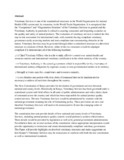| dc.description.abstract | Veterinary Services is one of the standardized structures in the World Organization for Animal Health (OIE) system and, by extension, in the World Trade Organization. It is recognized that the “Competence” and “Organization Structure” of the Veterinary Services in general and the Veterinary Authority in particular is critical to assuring consumers and importing countries on the quality and safety of animal products. The evaluation of veterinary services is indeed the first step in risk assessment for international trade, with countries having compliant veterinary governance easily accessing markets and non-compliant ones encountering obstacles in the matter. Veterinary Services may be governed through either a centralized structure or a devolved structure or a mixture of both. However, either of the two structures would be adjudged compliant if it demonstrates all of the following baselines:
A Chief Veterinary Officer who is able to apply effective control over animal health and zoonoses matters and international veterinary certification in the whole territory of the country.
A Veterinary Authority in the central government which is responsible for the observance of international sanitary obligations by regional, county or non-governmental entities in its territory.
Strength in terms expertise, competence and resources capacity;
A coordination mechanism with clear chain of command that can be implemented as necessary to address all activities throughout the country.
The New Constitution of Kenya provides for devolution of government services between national and county levels. Historically in Kenya, Veterinary Services has been governed under a centralized system with field offices in all units of public administration and with a direct chain of command across the country and which has been responsible for animal product quality control services. The new Veterinary Services would be administered by counties with the national government retaining the role of formulating policy. These provisions are new and therefore Veterinary Services will need to be restructured to fit into the emerging order of national governance.
The constitution does not provide details of how national and county levels of Veterinary Services, including animal products quality control, would perform to achieve effectiveness. These details would be provided by legislation as well as by general government administration. Nevertheless there are several sections of the constitution whose appropriate interpretation would provide opportunity to restructure and create internationally compliant veterinary governance. This Paper will provide highlights on devolved veterinary structures and make suggestions on how Kenya‟s Veterinary Services may be restructures to conform with both the new constitution as well as international standards. | en_US |

